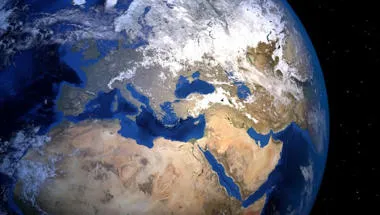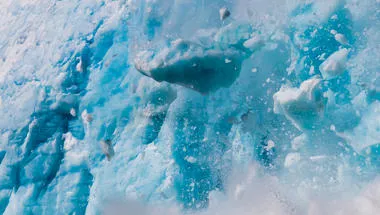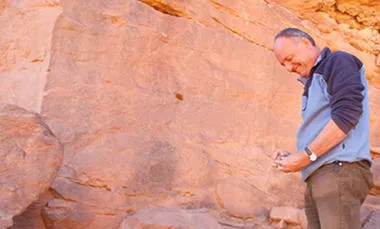
Dr Paul Breeze
Lecturer in Climate Change and Environmental Science
Research interests
- Geography
Contact details
Biography
Dr Paul Breeze is a Physical Geographer and Archaeologist, with interests in Quaternary climate dynamics and past human-environment interactions. He is a lecturer in Climate Change and Environmental Science in the Department of Geography. Paul completed his PhD in the Department of Geography. His thesis focused on developing novel remote sensing and GIS techniques to reconstruct palaeohydrology across Arabia and the implications of these data for past climate change and hominin dispersals. Between 2016 and 2023 he was a researcher on various projects and a Leverhulme Early Career Fellowship in the department, along with periods at the University of Cambridge, as a consultant, and as a visiting lecturer at Royal Holloway (2017-18). Prior to his PhD he worked for and obtained his MA (Practical Archaeology) and BSC (Geology and Archaeology) from, the University of Birmingham. Paul specialises in the use of remote sensing and GIS, and synthesising past climate data with archaeological records to identify and contextualise new research sites and map past opportunities for human dispersals. He has performed fieldwork in deserts across Arabia, North Africa, and Asia since 2009, with field specialisms in landscape survey, UAVs, desert navigation and geomorphology, and the investigation of palaeoenvironmental, palaeontological, and archaeological sites.
Research
- Past human-environment interactions
- Palaeoclimate dynamics
- Pleistocene dispersals of Homo sapiens and other hominins
- Quaternary hydrological and geomorphological fluctuations in deserts
- Remote Sensing
- GIS
- Multi-scalar spatial survey
- Land degradation
- Dust source mapping in deserts
- Integrating palaeohydrological data with climate model hindcasts.
A core focus of Paul's interdisciplinary research is refining our understanding of past climate change in deserts and its impact on humans and earlier hominins, by integrating palaeohydrological, palaeoclimate proxies, and archaeological data. His past work has produced new regional palaeoclimate syntheses, identified and recorded numerous new archaeological sites and palaeoenvironmental proxy records, and produced the most spatially detailed maps of palaeohydrology to date for the deserts of North Africa, Arabia, and western Asia. This research has helped to refine models of our own species' early movements out-of-Africa and of past climate change and landscapes in the Saharo-Arabian and Asian deserts, map dust storm sources in these deserts, and evaluate human subsistence and resource management strategies in relation to past ecological changes.
Teaching
Paul teaches on a variety of modules, in relation to past human-environment interactions and climate change and environmental science approaches used to understand this, and the use of Remote Sensing and GIS for environmental research.
Undergraduate
- 4SSG1011 Principles of Geographical Inquiry (Spatial data manipulation and presentation)
- 4SSG1008 Geography Tutorials
- 5SSG2051 Climatic Variability, Change and Society
- 5SSG2061 Geographical Research Skills (Remote Sensing for Environmental Research)
- 6SSG3028/7SSGN029 Environmental Remote Sensing 2
Postgraduate
- 6SSG3028/7SSGN029 Environmental Remote Sensing 2
- 7SSGN031 Modelling Environmental Change
Further details
Research

Physical Geography and Environmental Science research group
Enhancing understanding of processes, drivers and impacts in water, land, atmosphere and ecosystems to address environmental and societal challenges.

Earth Observation and Environmental Sensing Hub
The Earth Observation and Environmental Sensing (EOES) Hub is an interdisciplinary research group at the Department of Geography, King’s College London.

King's Climate Research Hub
Studying climate change through the relationship between science, policy and culture.

King's Water Centre
Researching water, environment and development. Our centre spans the humanities, social, and physical sciences to explore the challenges of water governance from global to local scales.
News
New research reveals how repeated climate change allowed early humans to move into the Arabian Peninsula
Satellite mapping analyses have located ancient lake deposits with archaeology, which show how dramatic climate change repeatedly allowed past humans,...
Dramatic climate change allowed humans and elephants to walk together into the deserts of Arabia 120,000 years ago, new research reveals
The earliest evidence yet for human and animal movement into Saudi Arabia’s Nefud Desert – fossilized footprints imprinted in the muds of an ancient lakebed –...

Fossil Finger Points to Earlier Human Migration
An international team, including Professor Nick Drake and Dr Paul Breeze, has discovered the first fossil evidence of early humans, Homo sapiens, on the...

Research

Physical Geography and Environmental Science research group
Enhancing understanding of processes, drivers and impacts in water, land, atmosphere and ecosystems to address environmental and societal challenges.

Earth Observation and Environmental Sensing Hub
The Earth Observation and Environmental Sensing (EOES) Hub is an interdisciplinary research group at the Department of Geography, King’s College London.

King's Climate Research Hub
Studying climate change through the relationship between science, policy and culture.

King's Water Centre
Researching water, environment and development. Our centre spans the humanities, social, and physical sciences to explore the challenges of water governance from global to local scales.
News
New research reveals how repeated climate change allowed early humans to move into the Arabian Peninsula
Satellite mapping analyses have located ancient lake deposits with archaeology, which show how dramatic climate change repeatedly allowed past humans,...
Dramatic climate change allowed humans and elephants to walk together into the deserts of Arabia 120,000 years ago, new research reveals
The earliest evidence yet for human and animal movement into Saudi Arabia’s Nefud Desert – fossilized footprints imprinted in the muds of an ancient lakebed –...

Fossil Finger Points to Earlier Human Migration
An international team, including Professor Nick Drake and Dr Paul Breeze, has discovered the first fossil evidence of early humans, Homo sapiens, on the...

